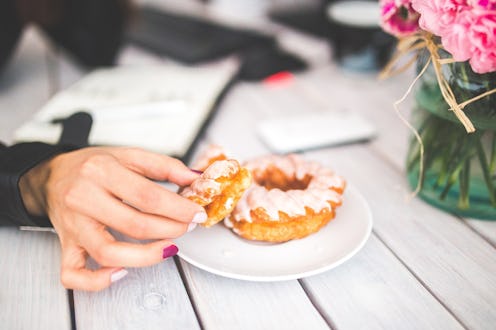Fashion
6 Foods That Could Be Ruining Your Skin, Ranked

Unfortunately, it's no surprise that there are certain foods, probably including some of your favorites, that negatively impact your skin. But how to do those foods that could be ruining your skin rank against one another? After all, you've probably heard again and again that foods like chocolate or foods that contain dairy or are particularly greasy aren't the best for skin health. But maybe, just maybe, if the foods you couldn't live without actually aren't the worst for your skin, it would be OK to continue indulging. So to find out how those bad-for-skin foods compare, I emailed with a handful of experts.
Dr. Hadley King, MD, New York City dermatologist; Dr. Elizabeth Tanzi, founder and director of Capital Laser & Skin Care and Assistant Clinical Professor for the Department of Dermatology at the George Washington University Medical Center; Paula Simpson, holistic beauty expert and co-founder of ZSS Skincare Solutions; Dr. Nancy Steely, ND, MBA Arbonne Senior Director of R&D, Nutrition; and Joanna Vargas, celebrity facialist and founder of Joanna Vargas Salon and Skincare Collection, all weighed in on just how bad certain foods are for you skin. Ranked from bad to worst, here are six foods and ingredients to consume in moderation to mitigate the havoc they could be wreaking on your skin.
6. Sodium
According to Simpson, consuming too many foods that are rich in salt leads to dry, flaky skin because sodium absorbs moisture. Avoiding foods such as soy sauce, cured meat, cheese, instant soup, and fast food altogether doesn't sound so exciting, so she stresses the importance of staying hydrated to combat any drying effects.
5. Wheat
According to Vargas, wheat can be difficult to digest and can lead to breakouts. Because wheat tends to be used in other types of foods that aren't great for skin (like processed baked goods and high-glycemic foods), it's best to check ingredients labels if you have a sensitivity to wheat.
4. Dairy
"There is evidence to show that dairy consumption can aggravate skin health, particularly blemish-prone conditions," says Simpson. She explains that experts propose the dairy in foods such as milk, cheese, yogurt, and ice cream may be responsible for a variety of factors such as stimulating oil production and pro-inflammatory reactions. It is also possible that dairy leads to interrupted hormonal activity.
If you love your dairy, Dr. King reports that certain literature suggests "fat-free dairy may not contribute to acne unless you are sensitive to milk proteins." However, because there are still conflicting research results, if you fear dairy may be causing or exacerbating your breakouts, you may want to cut back.
3. Processed Foods
Dr. Steely explains, "Processed foods tend to have a lot of additives and preservatives, in addition to a lot of potential sensitivity-inducing ingredients that contribute to inflammation." When inflammation affects your immune system, you'll see the results on your skin in the form of puffiness, redness, and blotchiness. While Dr. Tanzi warns especially against processed baked goods like muffins and donuts, Dr. Steely generalizes to "anything with a label" as something that should be limited as much as you feel comfortable doing.
2. Sugar/High Glycemic Foods
According to Dr. Steely, when sugars bind to proteins and fats in the body, it creates molecules that age your skin. These molecules impact collagen and elastin to aid in wrinkle formation and can negatively affect skin tone. Simpson further explains that "consistent high blood sugar levels cause fluctuations in hormones that may over-stimulate the oil glands, triggering blemish flare-ups in acne-prone skin."
So if you want to avoid unnecessary breakouts and premature aging, Dr. Tanzi suggests avoiding foods such as pastries, bagels, candy, sugary cereals, and jarred tomato sauce. Dr. Steely also recommends watching out for hidden sugars in juices, as these can seem healthy until you realize just how much sugar is in them.
1. Alcohol
Perhaps the only food or ingredient potentially worse for your skin than sugar is alcohol. Dr. Steely explains that not only is alcohol dehydrating, but it also "taxes the body's antioxidant levels, [which] means [fewer] antioxidants available to quench free radicals that can contribute to the development of wrinkles [and the] breakdown of collagen in the skin." What's more is that if you already have rosacea, according to Dr. King, alcohol is a common trigger that could lead to flareups. So while it's best to consume in moderation, Dr. Steely recommends staying hydrated by drinking enough water whenever you have a cocktail.
Image: kaboompics/Pixabay